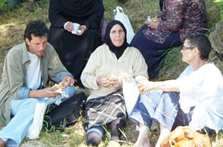7 Ways to Make Yourself Happier in the Next Hour
You can make yourself happier â€" and it doesn’t have to be a long-term ambition. You can start right now. In the next hour, check off as many of the following items as possible.

TEL AVIV — Some friendships are cemented by unspeakable pain. That's what binds members of the Parents Circle Families Forum, a group of Israelis and Palestinians who've lost close family members and who're committed to going beyond the grief to a better future. Recently, more than 100 Forum members spent a day at Israel's national Holocaust museum, and a day in the empty expanse of a Palestinian village, in what is now Israel, that was destroyed by Israeli forces in 1948…
This two-day experience is the first step in a process they call "Knowing is the Beginning."
In their decade of advocacy for reconciliation between Israelis and Palestinians (often against harsh critics in both communities), Forum members shied away from jointly confronting their respective national traumas. They feared losing the trust they've developed because, unlike the bridge-building capacity of shared personal grief, talking about national wounds and narratives often creates distance and alienation.
Now, they're breaking the taboo and opening up questions about core national traumas
For example, to Israelis, and Jews in general, nothing is more odious than the claim that the Holocaust is exaggerated or the comparison of Israel's occupation practices to Nazi actions against Jews. And, yet, that's what some Palestinians believe — or, at least, say.
For Palestinians, nothing triggers a more visceral reaction than to hear Israelis' denial of what Palestinians refer to as the Nakba (catastrophe), in which hundreds of villages were destroyed and their residents rendered refugees during Israel's 1948 War of Independence. And yet, Israelis minimize such claims, arguing that Palestinians distort the facts. Most Israelis and Palestinians feel that facing the other side's pain betrays and dilutes the legitimacy of their own claim to statehood in a disputed area. They retreat into defensiveness and shut down the conversation in what becomes a zero-sum battle over victimhood — with room for only one winning narrative.
That's what the Forum members are trying to change. Their premise is that facing and feeling the other's pain — without judging or comparing it to one's own — is a necessary step to building a future together rather than continuing the pattern of a destructive past.
They acknowledge the risks involved. First-hand exposure to the "other" narrative pierces the comfort zone and protective armor of denial and prejudice, but doesn't promise understanding. So far, the Forum's experience demonstrates that sharing personal grief is a powerful step toward reconciliation, but now they're testing if their experience of facing national trauma together can build an even bigger bridge. And if anyone has the chance to break down such barriers, it's individuals and families who've paid the ultimate price and sacrificed the most. Encouraged By Early Reactions
The idea for this latest experiment first surfaced when a Palestinian member of the group wanted to see for himself whether the Holocaust actually happened. Other Palestinians balked, while Israelis hesitated to confront Palestinians' attachment to disappeared villages.
But after the visits, when Yaacov Guterman — himself a Holocaust survivor and bereaved parent — acknowledged the tragedy of Ekbeba but said: "I was in that Hell [the Holocaust] and this isn't the same." His words were greeted with quiet respect by Israelis and Palestinians alike.
In a world where Holocaust denial is still propagated, the capacity of Israelis and Palestinians scarred by war and loss to unflinchingly face truth together is laudable. The power of the Parents Circle Families Forum has always exceeded its numbers. If it can harness national narratives in the cause of mutual understanding, that's a cause for hope in this part of the world.
Be the first to comment